The Egg Thief
For decades Jeffrey Lendrum helicoptered up and rappelled down to aeries on cliff faces from Patagonia to Quebec, snatching unhatched raptors and selling them, investigators believe, to wealthy Middle Eastern falconers. This week in London, one of the most bizarre criminals in modern history goes on trial for the fourth time. Here is his story.
Heading out the door? Read this article on the Outside app available now on iOS devices for members! Download the app.
Just before noon on May 3, 2010, John Struczynski, a janitor at Birmingham Airport in the British Midlands, observed something peculiar. A balding, middle-aged passenger had entered the shower room in the Emirates Airlines first-class departure lounge and emerged after what seemed like a long time. But when Struczynski stepped inside the facility to check it, he saw that the shower and floor were bone-dry. Then he noticed, at the bottom of a diaper bin, a cardboard carton containing a single egg, dyed blood red. Mystified, and suspecting that something illegal was afoot, Struczynski alerted airport security.
A few minutes later, a pair of plainclothes counterterrorism agents accosted the passenger, led him to a private room, and searched him. Beneath his shirt, they discovered ribbons of surgical tape wound around his abdomen. The tape encased three woolen socks containing a total of 14 smallish eggs ranging in color from brick red to marbled brown. The man claimed they were duck eggs, and he offered the police a curious explanation: his physiotherapist had recommended that he wear the eggs pressed against his belly to force him to keep his muscles taut and strengthen his lower back.
At that point the police phoned Andy McWilliam, a veteran investigator with the National Wildlife Crime Unit, a branch of the British police established in 2006 to combat offenses ranging from badger baiting to ivory trading. From the officer’s description, McWilliam felt all but certain that the eggs were those of the peregrine falcon, the fastest animal alive, a bird of prey that nests, in the UK, in cliffs along the west coast from Wales to Scotland. Peregrines suffered a dramatic decline in population during the fifties and sixties, largely because of the widespread use of the pesticide DDT; by the early seventies, only about 350 breeding pairs were left in Great Britain. The pesticide was banned throughout the world beginning in the early seventies, and since then the population has climbed back to about 1,500 pairs. But the birds are still protected in the UK, and the theft of their eggs in the wild can be punishable by jail time.
“I suggested to the police that they arrest him on suspicion of possessing wild bird eggs,” McWilliam says, “and I told them that I’d be down there in two hours.”
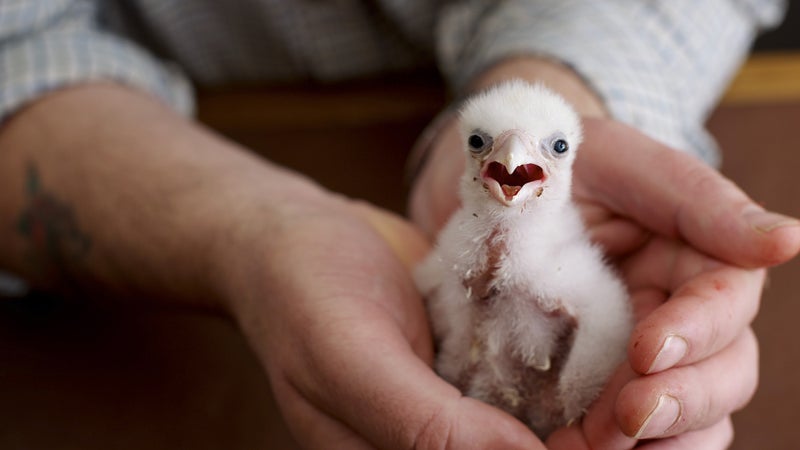
McWilliam contacted a well-known raptor breeder named Lee Featherstone and asked him to head to the airport. Featherstone confirmed that the eggs strapped to the man’s body were indeed peregrine and, using a digital monitor called an Egg Buddy, determined that 13 of the 14 were alive, two weeks from hatching. (The remaining egg, the dyed one, was a chicken egg, presumably a decoy in case the man had been stopped on his way through security.) The next morning, as the chicks-to-be continued to incubate, McWilliam and two counterterrorism agents interrogated the suspect in a room near his holding cell. “We let him string us along about the duck eggs, and then I took over the interview,” McWilliam recalls. “I said, ‘You and I both know these are not duck eggs, they are falcon eggs.’ ”
“At that point,” McWilliam says, “he realized that he couldn’t pull the wool over us any longer.” The detained man, who carried Irish and South African passports identifying him as 48-year-old Jeffrey Paul Lendrum, reluctantly admitted over the course of several interviews that he had taken peregrine eggs from cliff ledges in the Rhondda Valley, in southern Wales. Lendrum insisted that he believed the eggs he’d pilfered were no longer alive and said that he had been transporting them, via Dubai, to his father’s home in Zimbabwe to add to the family egg collection. It wouldn’t take McWilliam long to conclude, though, that this was no ordinary trophy hunter.
Interpol estimates that the illegal wildlife trade is worth as much as $20 billion a year, among the world’s most lucrative black markets. But that trade extends well beyond elephant ivory and rhino horn. Back in November 2009, police in Rio de Janeiro stopped a British pet-shop owner who was trying to smuggle a thousand large Amazonian spiders out of the country in his suitcases. In May 2017, police in East Java rescued about two dozen critically endangered yellow-crested cockatoos that a smuggler had stuffed inside water bottles. And multiple people have been arrested over the years for moving finches from Guyana to New York, where finch “races” in Queens pit the songbirds against each other to see which one sings fastest. One common smuggling M.O. is to dope the birds with rum and stuff them inside hair curlers.
Falcons, which encompass 39 species, are distributed on all continents except Antarctica. In some parts of the world, particularly in the UK, the threat posed by DDT gave way to a new menace: compulsive collectors who stole the eggs of protected species from their nests, blowing out the contents and mounting the shells. The thefts threatened numerous species—red-backed shrikes, ospreys, golden eagles, peregrines—before the Scottish police, in coordination with the Royal Society for the Protection of Birds, launched Operation Easter in 1997. Many of the perpetrators, it turned out, were middle-aged men driven by a need that even they struggled to understand. “Certain individuals just become obsessed with it,” McWilliam said in an interview for the 2015 documentary Poached. “It’s a self-obsessive, self-indulging crime. And why people risk going to prison for a bird’s egg, it just beats me.”
Those crimes seem quaint next to the illegal raptor trade in the Middle East, where devotees of falconry—the age-old sport of hunting quarry with a trained bird of prey—pay dearly for rare birds. “These falcons are worth a lot of money,” says Mark Jeter, a recently retired assistant chief at the California Department of Fish and Wildlife who follows the trade. “I always say, If there is a $50,000 bill flying around, someone is going to try to catch it.” In 2013 in Doha, Qatar, for example, a man reportedly paid $250,000 on the legal market for a pure white gyrfalcon, the world’s largest raptor and a bird so prized for its power and beauty that medieval kings used to hunt with them.
Beneath his shirt, they discovered ribbons of surgical tape wound around his abdomen. The tape encased three woolen socks containing a total of 14 smallish eggs ranging in color from brick red to marbled brown.
Demand in the Middle East is now mostly fueled by the spread of falcon racing, a sport that puts a premium on larger, stronger, and faster birds. But the Convention on International Trade in Endangered Species—to which the United Arab Emirates, Qatar, and Saudi Arabia are signatories—bans the import and export of peregrines and gyrfalcons, and since 2002, the UAE has required falcons to travel with a passport proving their legal provenance. Because of these restrictions and thanks to recent genetic advances, captive breeding has become much more popular.
Many enthusiasts in the Middle East, however, still believe that wild birds are genetically superior, and unscrupulous falconers have spent hundreds of thousands for birds acquired by “trappers” in Siberia, Kamchatka, and other raptor-rich environments. In 2005, for example, the illegal smuggling of saker falcons from Central Asia became so bad that the bird was declared endangered. By many accounts, the UAE has cracked down; according to a 2018 report on illegal wildlife trafficking by air transport, conducted by the nonprofit Center for Advanced Defense Studies, the UAE had the highest number of bird-trafficking seizures between 2009 and 2017, with the emirate of Dubai as the world’s most common destination.
“It’s not something that they shout about,” I was told by a leading breeder. “I’ve seen falcons come in when I was there last time. They had been hooded, and they were in a horrible state. The trappers had driven 3,000 miles from Siberia with the birds. The Emirates, Bahrain, Qatar, Kuwait, and the Saudis are getting involved. The Saudis make the Emirates look like beggars.”
The smuggling of eggs is much less common. And investigators believe Lendrum is essentially a highly specialized trapper—a daredevil with the skills to locate wild eggs in the most inhospitable places on earth and travel thousands of miles across international borders to deliver his prizes.
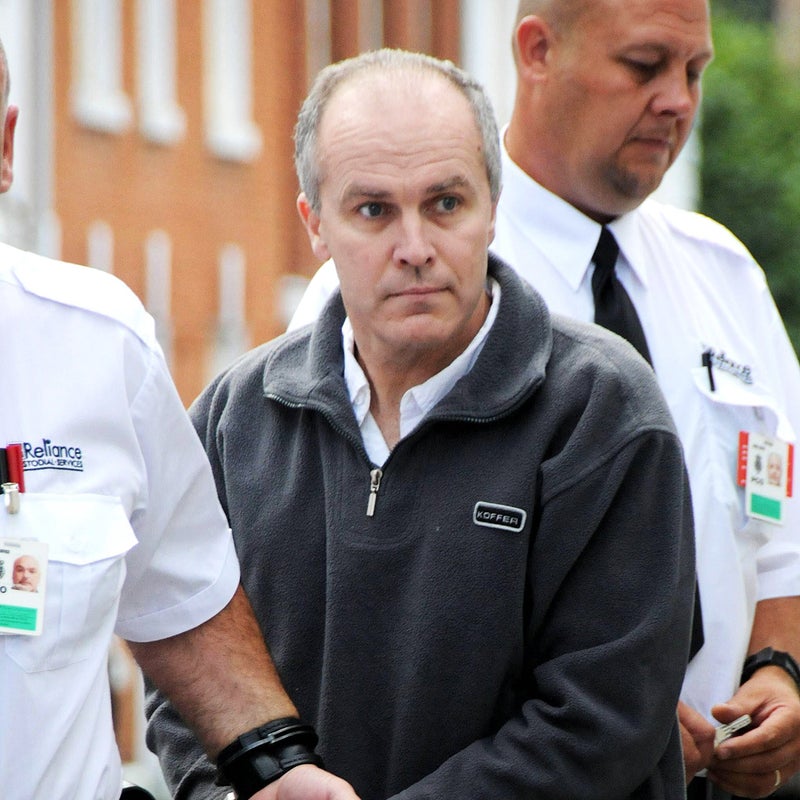
I spent more than a year on Lendrum’s trail, meeting acquaintances, family members, breeders, law-enforcement officials—and finally Lendrum himself. He insisted that his misdeeds have been grossly exaggerated. He told me that he’d only stolen live eggs out of nests twice in his adult life, both times to rescue the unhatched chicks from grave danger. He claimed that he had never traded with Arabs and that the actual prices for birds of prey on both the legal and illegal markets are so low that nobody could make a living smuggling eggs.
“The way Andy McWilliam blew the whole thing out of proportion, and got the media involved, they might as well have erected a gallows for me,” he said. But the more I learned, the more Lendrum’s denials failed to stand up to scrutiny.
The path that led me to Jeffrey Lendrum began at the central train station in Cardiff, Wales, when I met Ian Guildford, a Welsh investigator with the National Wildlife Crime Unit, on a windy, unseasonably frigid May morning. We followed a four-lane highway north and picked up McWilliam at a McDonald’s at a shopping center in Merthyr Tydfil. McWilliam is a stocky 61-year-old with a square jaw and thinning silver hair. He hopped in the car and we drove on past Aberdare, a coal-mining town sunk into ruin since the industry’s collapse in the 1960s.
Southwest of Aberdare, we switchbacked up through denuded pale-green hills, covered in places with netting to prevent landslides. Below us lay the stark and treeless Rhondda Valley, carved by glaciers during the Ice Age and bordered to the north by the red-sandstone peaks of Brecon Beacons National Park, dotted with the burial cairns of Bronze Age tribes. When we reached the top of the escarpment and got out of the car, I was nearly blown off my feet by a gust of wind. I righted myself and followed the two officers across a treeless meadow, sinking to my knees in spongy tufts of grass. Bent against the gale, we arrived at the edge of the cliffs. The ground fell away sharply, exposing gray-black outcroppings divided into steplike ledges sheltered from the wind: perfect spots for peregrines to lay their eggs.
“We’re at the end of the bloody world,” shouted Guildford, a rangy, bespectacled Londoner with tousled brown hair, who has lived in Wales for three decades. We walked around the edge of the cliffs to another overlook, this one providing a panoramic view of the entire escarpment. McWilliam and Guildford scanned the sky with their binoculars, searching for peregrines, but weren’t able to spot any.
During his interrogation of Lendrum in May 2010, McWilliam became increasingly certain that he was covering up more than he admitted. Yet he also knew that, under British law, the police could keep Lendrum in custody for just 36 hours before charging or releasing him. With the clock ticking, McWilliam searched Lendrum’s baggage and located his Vauxhall sedan in the airport’s long-term parking lot. He found carabiners, ropes, GPS devices, a satellite navigation unit that confirmed Lendrum’s movements in the Rhondda Valley—and, most incriminating, an incubator that had been adapted to plug into the car’s cigarette lighter.
Lendrum, he discovered, had roamed these cliffs for days, armed with grid points that narrowed the search zone, keeping an eye out for male falcons returning to their nests. “We tracked Lendrum’s vehicle,” McWilliam said, still shouting into the wind, “and we were able to say that he’d been down here in early April, three weeks before the nests were robbed.” After locating the ledges where the females laid their eggs, Lendrum had picked four different aeries and stole live eggs, according to his own admission to investigators. To pull off the theft, he would have had to set a fixed rope at the top of the escarpment and rappel down, scooping the eggs into an insulated bag as the peregrines flew off in terror.
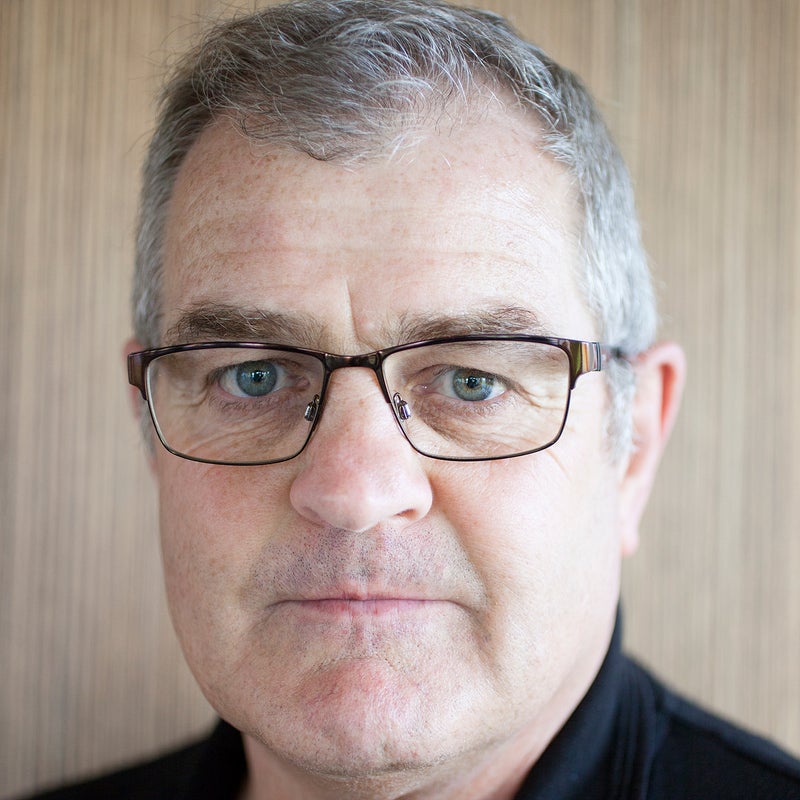
Lendrum’s trial was set for August 2010, and McWilliam used the summer to gather more evidence. Prosecutors would detail in court how the detective located Lendrum’s locker in a Midlands storage facility, finding more incubators (purchased on eBay before his mission), a copy of a letter from Lendrum to the author of a newspaper account describing his arrest in Canada in 2002 for stealing falcon eggs, and correspondence concerning a 1980s scheme to smuggle eagle eggs from southern Africa to a buyer in the United Kingdom.
As McWilliam described to me, he played a DVD confiscated from Lendrum’s carry-on and watched as he dangled by a rope from a helicopter over cliffside gyrfalcon nests, later found to be near Kuujjuaq, in Inuit territory in northeastern Quebec. He pored over laptop files that chronicled in minute detail a reconnaissance trip made to Sri Lanka in February 2010 in search of the eggs of the rare black shaheen peregrine falcon. “One seen flying off rock … good site with large overhang, several places with droppings,” an observation read. “Military guarding elephants in area and every time [you] step [from] the car, they come out of the trees to ask what you are doing. Hard access to rock and military make this a no go.”
Lendrum—or whoever had written the entries in his possession—had also cased the international airport in Colombo. “A few meters inside doors to departure area there is a security checkpoint consisting of a row of standard baggage X-ray units, walk-through metal detector,” the file read. “The guy who patted me down was very good at it and had been well trained.” McWilliam’s hunch, he believed, had been correct: he was in the presence of a sophisticated and prolific wildlife criminal.
Jeffrey Lendrum was born in 1961 in what was then white-ruled Northern Rhodesia. (His grandfather was apparently Irish, which enabled him to obtain an Irish passport.) The family soon moved to Bulawayo, Southern Rhodesia, a bustling railway center on the highveld, the vast grasslands covering southern Africa. As the oldest of three children, Jeffrey sometimes joined his father, Adrian, a human-resources manager at Dunlop Tires, on trips to nearby Matobo National Park, a game-rich wilderness of granite outcroppings with an unmatched concentration of raptors. From the age of eight, he earned a reputation as a nimble climber, scrambling up trees and rock faces studded with bird’s nests. In the seventies and eighties, Matobo was the site of one of the world’s most ambitious ornithological field projects. Run by a retired math teacher and bird enthusiast named Valerie Gargett, the African Black Eagle Survey recruited volunteers to observe large Verreaux’s eagles, a protected species, through courtship, nesting, and incubation, then watch the chicks fledge and venture out on their own.
Invited to assist on that project, and later to lead peripheral surveys of augur buzzards and African hawk-eagles, the Lendrums gained access to hundreds of nesting sites compiled by the Rhodesian Ornithological Society (now BirdLife Zimbabwe). For nearly a decade, while guerrilla war raged in the bush between the white-minority regime and black rebels led by Robert Mugabe, father and son roamed the park together. “It was derring-do stuff,” says Pat Lorber, a former Black Eagle Survey member. “They would throw a claw into a tree and climb up as high as they could. It required a lot of skill and not a little risk.” Yet many team members eventually became suspicious of the Lendrums. They would report that a chick had fledged, recalls Lorber, “and we would drive by and there was nothing in the nest, and it didn’t look like it had been touched for a year. There were lies, inconsistencies. After a while, Val said to me, ‘There is something going on.’ ”
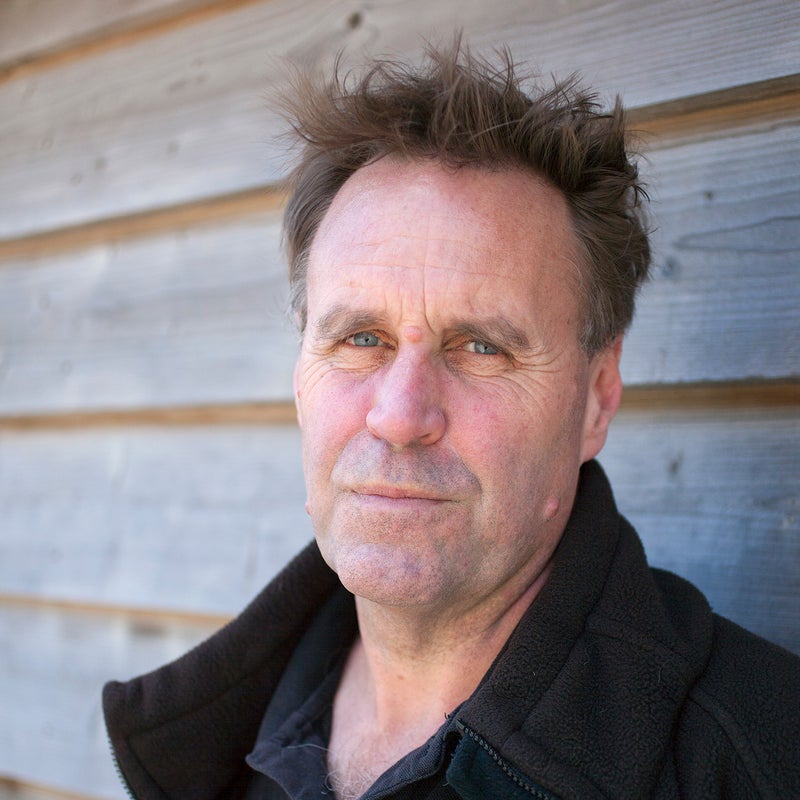
In October 1983, police raided the Lendrums’ home and discovered more than 800 eggs stashed in drawers, as well as live peregrine eggs refrigerated into a state of suspended development. Prosecutors charged that many had been stolen from nests inside Matobo. In court, witnesses made allegations—never proven—that Jeffrey Lendrum was selling live raptor eggs on the black market. The Lendrums insisted that they were only gathering dead eggs for their collection.
Jeffrey’s mother, a schoolteacher, and his younger sister and brother were not implicated in the scam. But after a three-month trial, father and son were found guilty of fraud and possession and theft of specially protected wildlife, fined thousands of dollars, and given four-month suspended sentences. Adrian Lendrum was also ordered to surrender his Toyota pickup truck, incubators, and egg collection. Shortly after, Jeffrey, now 23 and a pariah in his hometown, left Bulawayo and resettled in South Africa.
Lendrum would say that he gave up egg collecting once he settled in South Africa. For more than a decade, as the newly independent country of Zimbabwe economically disintegrated under President Mugabe, he moved mining equipment and spare auto parts into the country. Word got around—and would later be widely reported—that he’d been a member of the Rhodesian Special Air Service, an elite unit during the civil war. But Lendrum’s name does not appear on any SAS rolls.
Around 1998, a girlfriend introduced him to Paul Mullin, a British expat who worked for an American company building internet infrastructure in southern Africa. Mullin has since changed his name—for reasons that will soon become clear—and now lives in Hampshire, in southern England. (At his request, Outside is identifying him by his former name.)
“We used to have coffee and a chat about Africa,” he told me. “Jeff would say, ‘Come up to Zimbabwe, we’ll go on safari.’ We started driving frequently to Bulawayo, Matobo, and Hwange National Park.” The pair became business partners, traveling from Botswana to Kenya buying tribal art and shipping it to England, where they set up a couple of African crafts shops that ultimately failed. But the two men complemented one another well, Mullin says: “Jeff could speak the local lingo, he knew the areas, he knew how to barter, and I had the money.”
This is where, Mullin alleges, their adventures began. According to him, Lendrum didn’t immediately reveal his more controversial activities. But by the early 2000s, Mullin claims, he began joining Lendrum on illegal trafficking journeys.
Here we should pause to state that Mullin and Lendrum are no longer friends. In 2008, Lendrum took up romantically with Mullin’s ex, who’d recently had a child with Mullin. Lendrum and the woman are no longer together, but the two men have spoken only a handful of times since.
Lendrum maintains that Mullin’s allegations are lies born of that grudge. Regardless of his motives, however, Mullin does have evidence of their exploits—plane tickets, diaries, notes, and video, including the one McWilliam watched in 2010—that clearly shows Lendrum approaching falcon nests and the pair’s helicopter pilot laughingly describing them as “fucking criminals.”
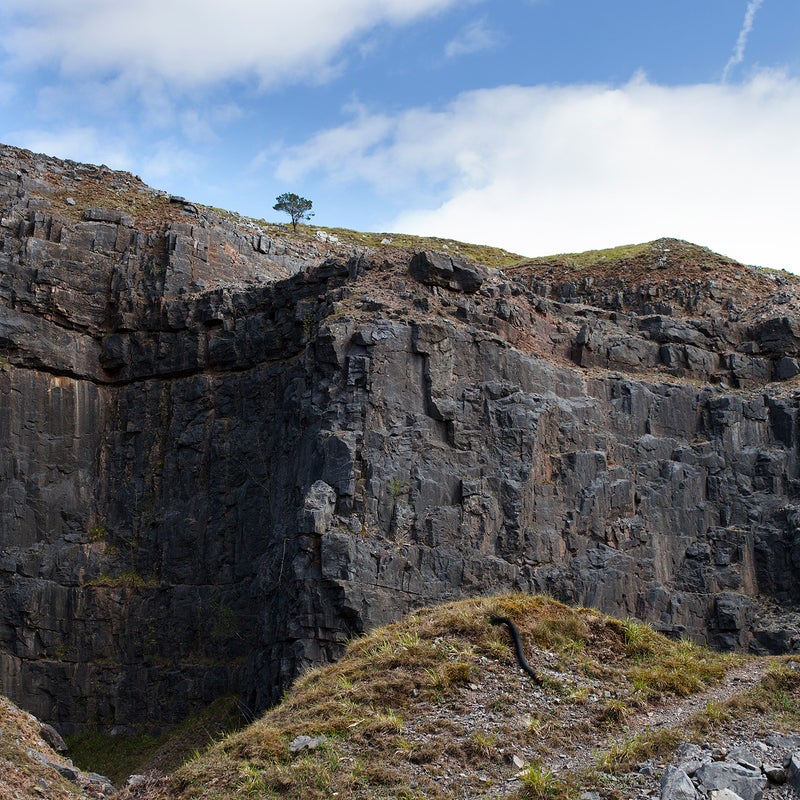
According to Mullin, Lendrum frequently offered a rationale for his work, arguing that the chicks would be better off being cared for by wealthy Arab falconers in a protected environment than exposed to harsh conditions in the wild. “What is the mortality rate of a bird in the wilderness?” he would ask. (In fact, nearly 80 percent of Verreaux’s eagles, for example, die during their first year in Matobo National Park, usually starving to death in the fierce battle for territory.) “Jeff took those chicks and eggs and brought them to Dubai, where they have wildlife hospitals better than human hospitals,” Mullin says.
He’s not far wrong: the Abu Dhabi Falcon Hospital treats more than 11,000 raptors a year and boasts its own ophthalmology wing and intensive care unit. Dubai’s leading falcon conservationist, Sheikh Butti bin Maktoum bin Juma Al Maktoum, a nephew of ruler Sheikh Mohammed bin Rashid Al Maktoum, has his own personal falcon breeder, Howard Waller, a leader in the field who also happens to be from Bulawayo.
Because Waller has known Lendrum since their school days together, he has long had to dodge accusations that he must be Lendrum’s buyer. “It’s always assumed it’s me,” Waller said when I visited him in northern Scotland, where he is based much of the year, “and there’s nothing I can do about that. I can’t change my childhood. What I can say is that we took different paths. My path was falconry and breeding falcons, and his path was collecting eggs. It’s always been a thrill for Jeff. He likes to beat the system.”
“We had a chat beforehand,” McWilliam recalls. “He knew he was going to prison, and when they said two and a half years, he looked at me and shrugged. I think his attitude was you win some, you lose some.”
Lendrum’s younger brother, Richard, echoed that sentiment. I met him in Johannesburg during the South African summer. He’s a lean, tan outdoorsman who for years has published the successful hunting and conservation magazine African Hunting Gazette. “We both love wildlife. It’s just that Jeff has gone a slightly different way,” he said with the trace of a smile.
From the time they were boys in Rhodesia, Richard said, he took little interest in the family egg collection, “turning a blind eye,” as he put it, to Jeffrey’s activities in the parks. But he was close enough to believe that, at some point, his brother went into illegal business with Middle Eastern buyers. “There are breeders who want these birds from around the world, so they get intermediaries to do their dirty work for them,” he says. “It’s well-documented that Jeff got caught.” Richard wasn’t certain when his brother began stealing eggs. He first learned about it in 2002, he said, when Jeff was arrested in Canada.
Like Waller, Richard believes that his older brother was mostly in it for the thrill. “It’s a high-adventure, high-adrenaline way of eking out a living,” he told me. “It’s just gone a little wrong.”
Over time, Lendrum’s missions became increasingly audacious. In June 2001, Mullin says, he accompanied Lendrum on the first of two trips to snatch gyrfalcon eggs in Canada. The massive raptor, whose plumage ranges from gray to snowy white, dwells in the far northern latitudes, laying its creamy pink eggs, four or five to a clutch, in depressions at the edge of cliffs.
“It was a military-style operation,” Mullin told me. Lendrum recruited an old pilot friend, and in Montreal the men loaded a rented Bell 206 JetRanger helicopter with cold-weather gear, power units, lights, cameras, a professional video recorder, GPS devices, climbing equipment, and mobile incubators. For cover, they posed as filmmakers with the National Geographic Society.
The pilot, when I later reached him, refused to talk. Lendrum himself admitted to traveling to northern Canada with Mullin and the pilot, but he claims it was a sightseeing trip. Regardless, the trio flew 900 miles north to Kuujjuaq, an Inuit village at the northern edge of Quebec, choppering deep into uninhabited wilderness. The pilot hovered next to cliffs that towered above lakes south of Ungava Bay. In Mullin’s video, Lendrum can be seen coolly approaching a gyrfalcon nest by dangling from a fixed line fastened to the helicopter, and carrying an insulated bag, presumably for eggs.
Mullin didn’t film any actual snatches, but he claims that Lendrum grabbed eggs from nests as female gyrs anxiously circled nearby (another allegation that Lendrum disputes). Over the course of a week, Mullin estimates, the men raided 19 gyrfalcon nests and gathered about a dozen live eggs, then flew safely back to Montreal and on to Heathrow Airport. “All the eggs were wrapped in socks and stashed in Jeffrey’s carry-on, surrounded by other material to keep the temperature right,” Mullin says. “Jeff kept monitoring the temperatures, making sure they were still alive.” The pair parted ways at Heathrow, where, according to Mullin, Lendrum flew on to Dubai. Lendrum says that all of this is “rubbish.”
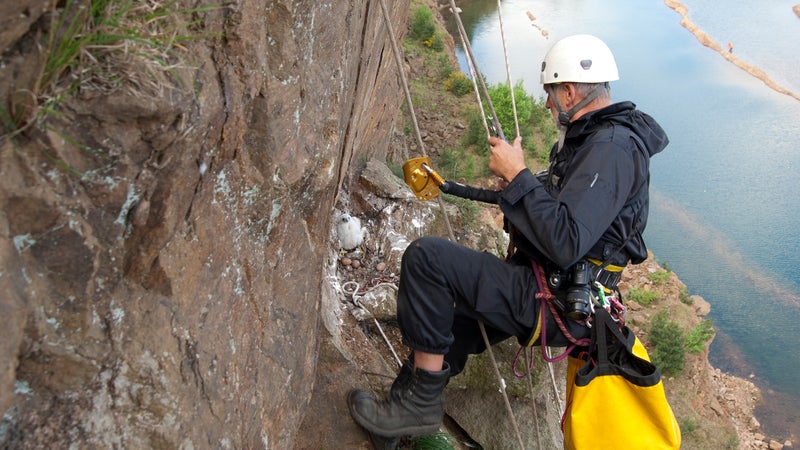
What’s not in dispute is that Lendrum and Mullin returned to the Arctic a year later. This time they hired a helicopter and a local pilot in Kuujjuaq. Again they flew into the wilderness, but Lendrum had the pilot leave them at various cliff ledges and return every couple of hours to ferry them to new spots—a plan that raised the pilot’s suspicions. “Any wildlife photographer who’s serious would ask to be dropped off at sunrise and picked up at sunset,” the pilot told me, requesting anonymity to avoid further association with the caper. “Who in the hell keeps asking me to go back to town?” He remembered the pair from their trip the year before, and now Mullin’s amateurishness with the camera made him even more wary. “I’ve worked with wildlife photographers a lot,” he said, “but the guy in the back seat was just playing with the camera.”
On their third day in the field, the two men stumbled around for hours in whiteout conditions. “We were freezing to death,” Mullin says. “We got a total of seven eggs, and that was enough.”
The next afternoon, Mullin says, brought disaster. “We were in our room at the inn, shooting the shit, and then out of the blue there’s a knock on the door. I looked at Jeff. I said, ‘This is it.’ I opened the door, and in rushed four guys from provincial wildlife protection and the Sûreté du Québec. They said, ‘Are you Jeffrey Lendrum and Paul Mullin? You’re under arrest.’ ” The authorities, who had been tipped off by the pilot, seized the eggs, as well as two incubators and the rest of the men’s equipment. According to law-enforcement sources, the men were fined a total of $7,250 for six counts related to illegal possession of wildlife.
This was when Mullin decided to change his name, which had been published in Canadian newspapers. He ended his telecommunications gig in Africa and moved home to southern England. Lendrum went to England as well, marrying a French-Algerian woman in 2002 and moving in with her and her two teenage daughters in a quiet Northamptonshire village. Mullin was best man at their wedding.
The egg thief had—ostensibly—settled down. But a few years later the marriage ended, and in 2008, Lendrum took up with Mullin’s ex, triggering the bitter falling-out between the longtime friends.
When Lendrum was busted in Birmingham in 2010, he was dividing his time between England and Johannesburg. That August, he pleaded guilty to one count of theft of a protected species and one count of attempting to export a protected species. “We had a chat beforehand,” McWilliam recalls. “He knew he was going to prison, and when they said two and a half years, he looked at me and shrugged. I think his attitude was you win some, you lose some.”
At Hewell Prison in the Midlands, Lendrum was known by fellow inmates as the Bird Man. McWilliam visited him, hoping to gather intelligence about egg-smuggling networks in Great Britain and the Middle East, but Lendrum would surrender no information, insisting again that his operation in the Rhondda Valley had been a one-off.
Nonetheless, the two men continued talking, in phone calls that Lendrum would make to the investigator every few months from prison, and then on parole after he was released nine months into his sentence, with the requirement that he remain in the United Kingdom for another nine months. “He was staying somewhere down south in England, he was quite bored, and he’d ring me up to talk,” McWilliam recalls. “He might see something in the newspaper about elephant ivory or call me about a parking ticket. He talked about rhino horn and how regulators were going at it all wrong. I had a bit of a rapport with him. I respected him without wanting to condone what he did.”
Lendrum was 51 by the time he completed his parole in 2012. He headed back to South Africa, chastened and determined to make amends. His brother helped him get back on his feet, giving him a job at African Hunting Gazette, verifying hunting lodges’ claims about how much game they had on offer. But the Bird Man’s attempt to go straight quickly encountered obstacles. Subscribers besieged a popular online hunting forum, protesting the hiring of a convicted wildlife criminal. Jeffrey begged readers to keep an open mind. “Obviously, I am not perfect,” he wrote. “I was judged by a judge and paid the price…. Do I have to keep paying? I am sincerely sorry. Is there no place in your thoughts to give a criminal a chance after doing his time?” But Lendrum’s note of contrition failed to stem the steady pressure from Gazette subscribers and advertisers, and in 2014, his brother had to cut him loose.
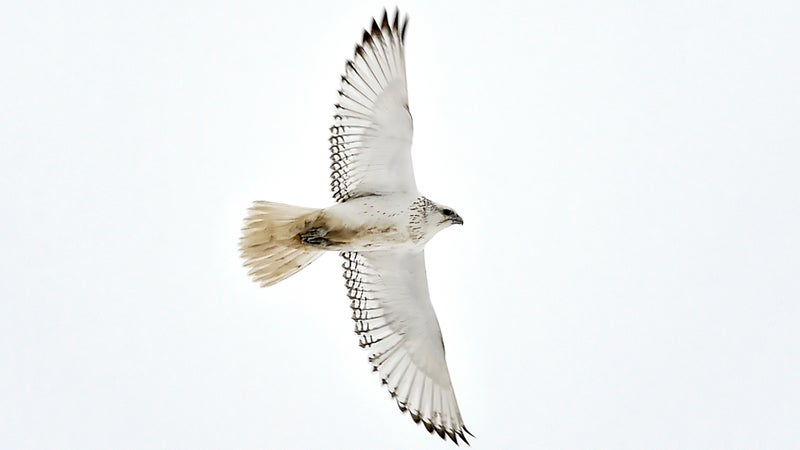
It was perhaps inevitable that Lendrum would be drawn back to the aeries. In October 2015, he traveled to southern Chile, registering under his own name at a hotel in Punta Arenas, in Patagonia, and carrying his usual array of incubators and climbing equipment. This time, however, a suspicious clerk had done a Google search and turned up articles about his arrests. He alerted Chilean authorities that Lendrum was flying out of South America via São Paulo, and the trap was set. On October 21, in a bizarre echo of his arrest five years earlier, Brazilian police detained Lendrum in the Emirates Airlines lounge in São Paulo as he waited for a flight to Dubai. According to Brazilian court records, he was carrying an incubator containing four eggs of a rare peregrine that lives in Tierra del Fuego.
“I don’t know how it happened or what was involved. It took us all by surprise,” says Richard, who surmised that his brother’s lack of legitimate employment drove him to return to his old ways.
As it turned out, Lendrum had one more trick up his sleeve. The court sentenced him to four and a half years in prison for theft and smuggling, but his lawyer persuaded the judge to release him on bail pending appeal. Lendrum surrendered his Irish passport. Then the egg thief slipped out of Brazil and dropped from sight.
In May 2017, shortly after my trip to Wales, I reached out to Mullin for help tracking Lendrum down. Their mutual friends thought that he had resurfaced in South Africa, which has no extradition treaty with Brazil, and was holed up at his sister’s house in Cape Town. Mullin gave me a cell number.
I reached Lendrum on the first try, identifying myself as a journalist who had just spent a day with McWilliam in the Rhondda Valley in Wales. He was wary, defensive. “Andy McWilliam is telling people that I was selling birds for a fortune,” he said in a pronounced southern African accent. “Everybody writes absolute rubbish about me. The whole media has portrayed me as the Pablo Escobar of the falcon-egg trade. Now I can understand why Trump calls it the fake media.”
Lendrum insisted he had nothing to do with the Arab falcon trade. “I must have climbed to a thousand nests and found an egg failure rate of 45 percent,” he told me. “I collected nothing but rotten eggs in Matobo, but that was used in evidence against me in England.” McWilliam, he insisted, had blown the case out of proportion to inflate the importance of the National Wildlife Crime Unit. “Andy said to me, ‘Your case was like manna from heaven for us,’ ” Lendrum said (a quote McWilliam roundly denies). “Soon after my trial, a law-enforcement officer was caught with an egg collection and got a 14-week suspended sentence. I got two and a half years in prison. How unfair is that?”
I asked Lendrum if I could visit him, and he said he would consider it. But when I called back a few days later, he told me that he had just been diagnosed with prostate cancer. “It’s a bad deal,” he said. He didn’t feel up for talking further.
Lendrum shook my hand and slowly moved off. Then, before disappearing around the corner, he turned and hit me with a mock proposition. “Do you want to steal some eggs sometime?” he asked, grinning.
Seven months later, I flew to Johannesburg on assignment and decided to seek out Lendrum one last time. Through friends of his family, I learned that his life had continued to spiral down. He was unemployed and living alone in a small rented home near Pretoria. Radiation treatment had weakened him, and he’d also been badly injured in a car accident in Johannesburg. Whatever money he might have made smuggling falcon eggs had been spent long ago.
“He’s got a very tough life,” Richard told me when I met him at a coffee shop in northern Johannesburg. “Nothing great at all.” Richard doubted that he would talk to me. His brother had ambitions to write a book, he said, and didn’t want to give away his trade secrets—or betray his powerful clients.
Two hours later I got Jeffrey Lendrum on the phone, and he suggested we meet south of Pretoria at the Forest Hill City Mall in Centurion—a town formerly known as Verwoerdberg, after Hendrik Verwoerd, the architect of apartheid. An Uber drove me across the parched plains of the highveld, past farms and tin-roofed shacks, to a giant shopping complex near a highway interchange. I made my way, as Lendrum had directed, to an Ocean Basket seafood restaurant overlooking an indoor ice-skating rink. He walked up to me minutes later, stuck out his hand, and introduced himself.
“You probably recognized me from my photos,” he said affably.
Lendrum’s receding hairline, black-framed glasses, and striped button-down shirt, hanging loosely over a pair of khaki shorts, made him look more like a clerk in a sporting-goods store than a daredevil adventurer. But he was tanner and healthier looking than I expected.
“I haven’t been doing anything, just trying to get better,” he told me. “I haven’t been well at all.”
Sitting across from me in a booth, sipping a cappuccino, Lendrum maintained again that, with rare exceptions, he had taken only addled (meaning dead) eggs and said that it made no sense that he would smuggle live falcon eggs for profit. “There’s no money in it,” he told me. “Listen, if falcon eggs were worth, say, $20,000, I’d have a Bell 407 helicopter parked outside, OK? To me it’s nonsensical.”
He characterized his 2001 trip to northern Canada as an innocent adventure. “It’s the most beautiful place in the world,” he said. “In a week, it changed from a place where you could land your helicopter on the lakes to greenness and bears and all the rest of it. If you had come out with me, you would have had such good fun.” Lendrum admitted that he’d raided gyrfalcon nests, but only to retrieve dead eggs for research. He had no explanation for why he was traveling with an incubator. “I thought to myself, I’m going there to check and see which eggs are addled, and to take the infertile ones to a Montreal museum,” he said. “I thought maybe I’d expose something like the DDT problem that happened with peregrines in the 1960s.” But his arrest—a misunderstanding, he said—forced him to abandon his plans. Likewise, he claimed, his nest-raiding trip to Wales nine years later had been a conservation mission.
The South American escapade was another well-intentioned lark gone wrong. Lendrum said that he’d been going down to Chile on a regular basis—six visits in a decade—drawn by some of the most bountiful and varied birdlife on the planet. “Magellans, oystercatchers, flamingos, peregrines—it’s incredible,” he said. On this trip, as with the others, he flew to Punta Arenas and drove to the tip of the continent, where he climbed inside volcanoes and rappelled down cliff faces to inspect some 18 peregrine nests. He admitted raiding one nest of live eggs—but only because the “female peregrine had died,” he said. “I took four eggs out of the nest,” he told me. “I honestly didn’t think that there would be a problem, maybe just a fine. I really wanted to get those birds into greater kestrel nests in South Africa.”
The escape from Brazil was relatively easy, he said. He traveled south to the country’s border with Argentina, then walked through the jungle for a day, carrying a GPS and a backpack full of food and water, evading patrols. He said he got a new passport from the Irish embassy and flew back to Johannesburg. (His Brazilian lawyer, Rodrigo Tomei, cast doubt on that account, saying that it’s more likely his former client simply grabbed a bus across the border and flew home on his South African passport. “Nobody was looking for him at the time,” he said.)
Lendrum told his story persuasively, looking me straight in the eye and leaving me to wonder, for a few moments at least, whether he had been wrongly judged. But many elements of his account were contradicted by the facts: the eggs seized in Quebec were live eggs, not addled, and he had no explanation for the incubators that the police had confiscated. He was flying to Dubai with those Patagonian falcon eggs, not to South Africa to get them into kestrel nests.
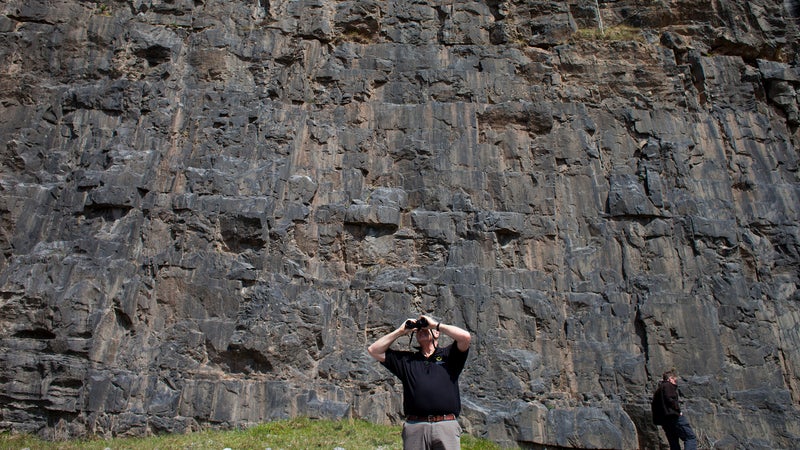
At one point in our conversation, out of the blue, Lendrum did make a startling assertion. “Look, I was asked to steal live eggs,” he said. “And I said it’s 99 percent unlikely that it would work. The length of time the eggs would be out of the nest, keeping them warm, keeping them on me—it’s just too long. A lot of people have asked me. In my book I will expose a lot of people.”
As our meeting wound down, I found myself wondering why Lendrum had agreed to talk to me at all. Perhaps he reasoned I already knew so much about his life that his only recourse was to bombard me with alternate facts. Maybe he hoped he could charm me into believing that all his convictions were bogus. But the weight of the evidence was overwhelming.
Still, Lendrum struck me as a tragic figure in some ways. A wildlife lover, ornithological expert, and master outdoorsman, he had followed a twisted path, driven by his misplaced obsessions and the thrill of the chase. Now, despised by conservationists, deserted by friends, broke, and sick, he had lost almost everything.
I asked Lendrum if he envisioned returning to a life of egg-hunting adventures. “I’m getting too old for it,” he replied, a little wistfully. The prostate cancer had depleted his energy, and the car accident had damaged the nerves in his neck and limbs. “I can barely raise my arms,” he said.
Lendrum shook my hand and slowly moved off. Then, before disappearing around the corner, he turned and hit me with a mock proposition. “Do you want to steal some eggs sometime?” he asked, grinning. “We’ll go into the Rhondda Valley and see how many peregrines we can get—right under Andy McWilliam’s nose. You do the climbing. We’ll make millions.”
That, I thought, would be the last I’d see of Jeffrey Lendrum.
I was wrong. Six months later, on June 29, the UK’s Home Office issued a press release: “Rare Bird Eggs Importation Prevented by Border Force at Heathrow.” A passenger from South Africa identified as a 56-year-old Irish national had aroused the suspicion of customs agents, who’d stopped him, searched him, and discovered 19 eggs from protected birds of prey—reportedly African fish eagles and black sparrow hawks, as well as two newly hatched vulture chicks—in a customized belt hidden beneath his clothing. Under British policy, a suspect is not identified until he is charged in court, but I had little doubt who it was.
Sure enough, a month later, British newspapers reported that Jeffrey Lendrum had been arraigned near Heathrow and charged with three counts of fraudulently evading prohibition—i.e., importing protected wildlife—then packed off to the Dickensian-sounding Wormwood Scrubs Prison in London to await a plea hearing in August. The details from the court appearance were skimpy—Lendrum’s defense had reportedly argued before the judge that his client was on his way to declare the eggs and chicks stashed in his hidden belt before he was intercepted—and I had a wealth of questions that, for the moment, couldn’t be answered. How had he procured the eggs? Who was he delivering them to? Why had the Border Force stopped him? And, most of all, what the hell was he thinking?
I flew up to London for Lendrum’s pretrial hearing on August 23. His attorney, Keith Astbury, had told me that his client intended to plead not guilty. But a jury trial would be a huge risk and could result in a far tougher jail sentence—up to seven years—than a plea bargain would. Did he really think he could get away with it? Astbury wouldn’t comment.
At Isleworth Crown Court, in a drab London suburb a few miles from Heathrow, I sat in the empty public gallery of a tiny second-floor courtroom, waiting for Lendrum to appear. I knew from Astbury that Lendrum had no interest in talking to me. But I hoped to make eye contact at least.
It wasn’t to be. Court officers escorted Lendrum from a holding cell to a bulletproof booth at the rear of the courtroom, completely out of sight of the gallery. I heard his disembodied voice—faint, downcast—say “I’m not guilty.” When I stood and craned my neck in an attempt to get a look at him, a court officer motioned furiously for me to sit back down. Lendrum’s solicitor promised to provide the judge with records about his client’s ongoing cancer treatment to expedite a request for bail. Then his trial was set for January 7, 2019.
Lendrum was taken out of the courtroom and put in a van back to Wormwood Scrubs to await the latest gamble of his risk-filled life. Given his record of the past few years, it was a bet he seemed destined to lose.
Contributing editor Joshua Hammer (@Joshuaiveshamme) is a longtime foreign correspondent and the author, most recently, of The Badass Librarians of Timbuktu.


